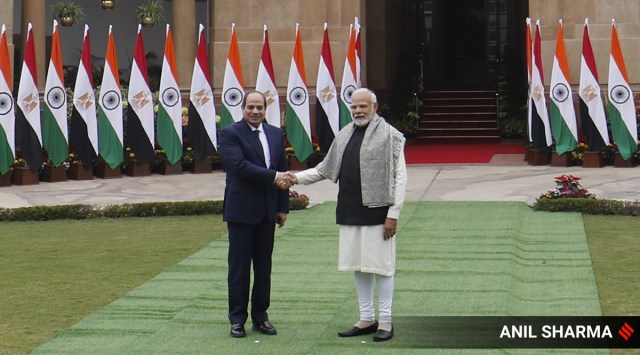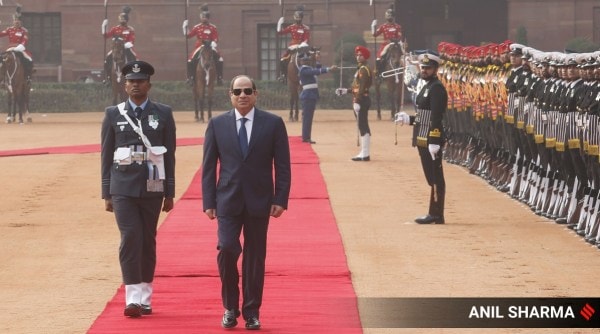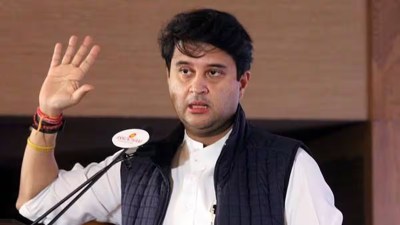He also said that both countries also agree that “concerted action is necessary to end cross-border terrorism” and that they will together alert the international community.

Sisi, who held talks with Modi, said that they shared a “common perspective” and that joint cooperation will help eliminate violence because the spread of violence, terrorism and extremist ideology represents a serious threat not only to the two countries, but also to all countries around the world.
Modi and Sisi, according to Foreign Secretary Vinay Kwatra, had a “warm and productive conversation”, after which they decided to elevate the bilateral partnership to the level of a “strategic partnership”.
Underlining that at one side of the Arabian Sea is India and on the other side is Egypt and that strategic cooperation between the two countries will help in promoting peace and prosperity in the entire region, Modi said, “We have decided that under the India-Egypt strategic partnership, we will develop a long-term framework of greater cooperation in political, security, economic and scientific fields.”
Sisi said, “Our discussions today witnessed a vigorous common will to promote relations between Egypt and India toward the strategic level. We agreed, during today’s deliberations with the prime minister, on the importance of convening the two countries’ joint commission as soon as possible and of establishing the operational mechanisms for their joint cooperation plans.”
On the issue of terrorism, Modi said, “India and Egypt are worried about the spread of terrorism happening around the world. We are unanimous in the opinion that terrorism is the most serious security threat to humanity. Both countries also agree that concerted action is necessary to end cross-border terrorism. And for this, together we will continue to try to alert the international community.”
Story continues below this ad
Sisi echoed this view. “We also tackled the best ways to combat terrorism and confront extremist ideology. We share a common perspective in this regard, namely that joint cooperation will help eliminate violence because the spread of violence, terrorism and extremist ideology represents a serious threat not only to our two countries, but also to all countries around the world,” he said.
 Egyptian President Abdel Fattah El-Sisi during a ceremonial reception in New Delhi on Wednesday. (Express photo by Anil Sharma)
Egyptian President Abdel Fattah El-Sisi during a ceremonial reception in New Delhi on Wednesday. (Express photo by Anil Sharma)
“We settled on the importance of intensifying cooperation in the field of security and giving impetus to more coordination in this vital area, as development is inconceivable without security and stability,” he added.
As the two leaders decided to elevate the ties to a strategic partnership, Foreign Secretary Kwatra said that there will be broadly four elements: political, defence and security; economic engagement; scientific and academic collaboration; and cultural and people-to-people contacts.
On the security and defence cooperation, Modi said, “There is also immense potential for enhancing security and defence cooperation between us. In the last few years, there has been a significant increase in joint exercise training and capacity building between our armies. We have also decided in today’s meeting to further strengthen cooperation between our defence industries, and enhance the exchange of information and intelligence related to counter-terrorism.”
Story continues below this ad
“Misuse of cyber space to spread extremist ideologies and radicalisation is a growing menace. We will extend cooperation against this also,” he said.
Sisi, who is Army chief-turned President, said, “Cooperation in the field of defense was on the agenda of today’s talks. Strengthening cooperation in that field is the best evidence of our common will to usher-in a strategic relationship between the two countries. We affirmed our interest to continue coordination, joint exercises, and exchange of experiences, and to explore broader horizons to foster closer cooperation in that field, including co-manufacturing.”
Foreign Secretary Kwatra said that both leaders shared their “common interests and priorities”.
Discussions on economic engagement was one of the key areas of discussion. Modi said, “Today, we have held extensive discussions on strengthening the food and pharma supply chains affected by the Covid and the Ukraine conflict. We also agreed on the need to increase mutual investment and trade in these areas. Together we have decided that in the next five years, we will take our bilateral trade to 12 billion dollars.”
Story continues below this ad
Sisi said, “We reviewed, during our talks, the two countries’ relations in the areas of trade and investment and where they are standing today. We confirmed our joint interest to continue to work toward increasing trade exchange and maximising the mutual benefit of our countries’ production and exporting capacities and advantages, so as to respond to the economic and social priorities of the Egyptian and Indian peoples.”
The Egyptian president said that he outlined to Prime Minister Modi about the investment opportunities, incentives and advantages available in Egypt, as well as the measures undertaken by the government to spur foreign investment.
“I confirmed that we look forward to an increase in Indian investments in Egypt in an array of fields in the Suez Canal Economic Zone, particularly after noting the intent of Indian companies operating in Egypt to further boost their presence, and the interest of Indian companies specialised in promising fields to inject their investments in Egypt,” Sisi said.
He also said, “Our visions were also aligned with regard to the importance of strengthening the ongoing cooperation in various fields and of moving toward partnerships in new areas, including cooperation in new and renewable energy, particularly the production of green hydrogen.
Story continues below this ad
“We also agreed on stepping-up our strategic cooperation in a multitude of areas, primarily agriculture; higher education; chemicals, fertilizers and medicines industries, as well as IT and communications and cyber security.
“I have also emphasised to the prime minister the need to establish regular channels that would allow the sharing of expertise and knowledge with regard to successful experiments and initiatives in the two countries, particularly in developing local industries and small and medium-sized enterprises, providing a decent life for the citizens and promoting their living standards.”
The two leaders also invoked the civilisational linkages. Modi said, “India and Egypt are among the oldest civilizations in the world. We have had a continuing relationship for thousands of years. More than four thousand years ago, trade with Egypt used to take place through the Lothal port of Gujarat. And despite various changes in the world, our relations have been stable, and our cooperation has been continuously strengthened.”
Sisi called for more tourism from India, “It is well known to you that Egypt and India share a civilizational dimension that is deeply rooted in human history. Therefore, we agreed on the need to further strengthen bonds and engagements at the cultural level, through the mutual participation in cultural activities in the two countries. We also agreed on the importance of facilitating communications between the peoples, so as to ensure a smooth movement of tourism between the two countries by intensifying flights between Egypt and India, notably the capitals Cairo and New Delhi. I affirmed to the prime minister that we fully welcome more Indian tourists in Egypt.”
Story continues below this ad
The two sides inked five agreements providing for cooperation in areas of culture, IT, cyber security, youth matters and broadcasting.
Sisi, who arrived in New Delhi on Tuesday and was received by Minister of State (External Affairs) Rajkumar Ranjan Singh, will be the first Egyptian president to be chief guest at the Republic Day celebrations.
An invitation to be the Republic Day chief guest is highly symbolic from the Indian government’s perspective. New Delhi has been weaving a strategy with hospitality to decide its chief guest on Republic Day. The choice of chief guest every year is dictated by a number of reasons — strategic and diplomatic, business interest and international geopolitics.
President Sisi was accorded a ceremonial welcome at the Rashtrapati Bhavan on Wednesday morning and President Droupadi Murmu will host a state banquet in honour of the visiting dignitary in the evening.



 Egyptian President Abdel Fattah El-Sisi during a ceremonial reception in New Delhi on Wednesday. (Express photo by Anil Sharma)
Egyptian President Abdel Fattah El-Sisi during a ceremonial reception in New Delhi on Wednesday. (Express photo by Anil Sharma)





